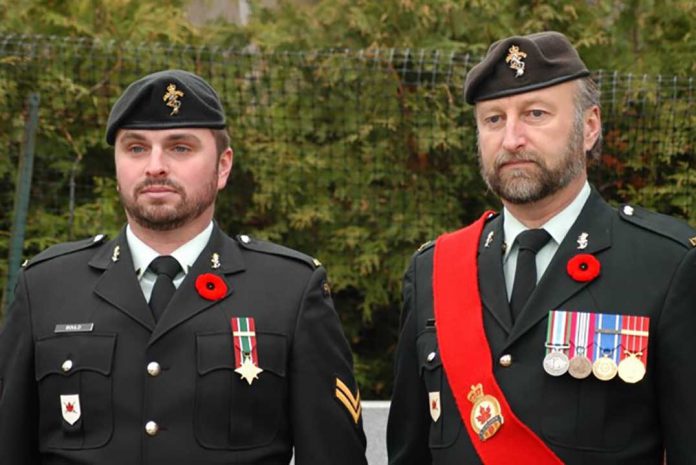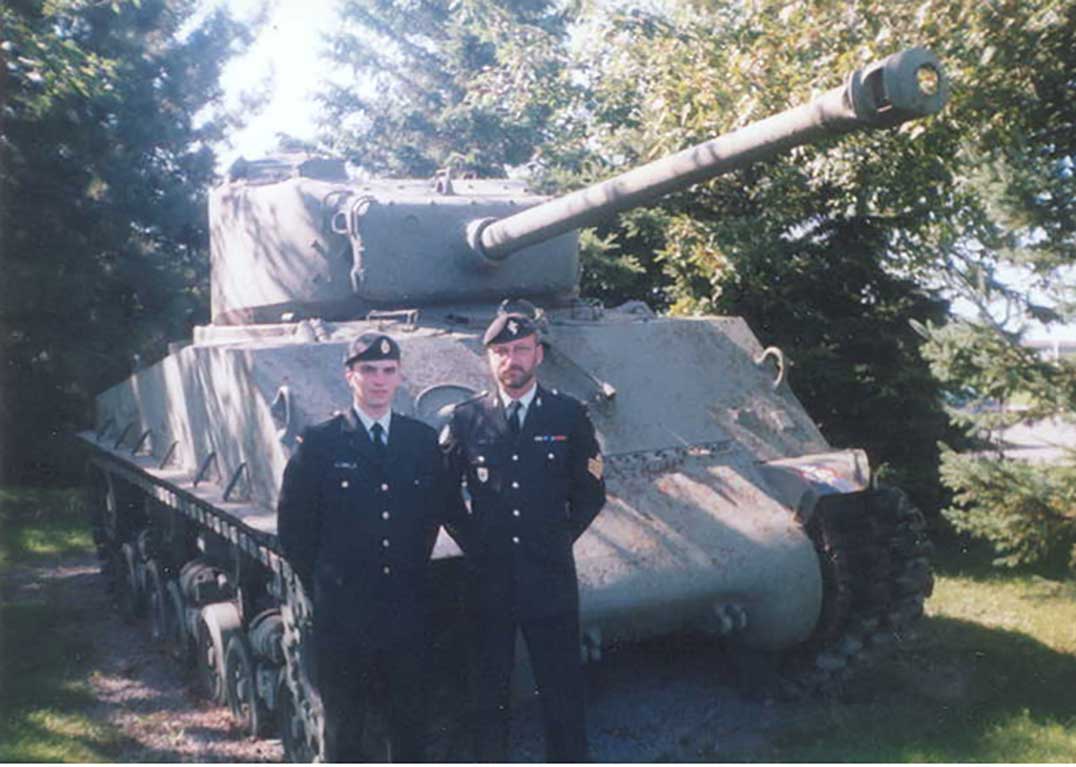
GORE BAY—Being a member of the Canadian Forces is something that (retired) Warrant Officer Jack Bould of Gore Bay was interested in early in life, counting the influence of his great grandfather in World War One and a Great Uncle in World War Two to help pave the way for his career direction. Mr. Bould’s son RJ has also followed suit and is a current member of the Canadian Forces.
“My great grandfather was James Jackson, a WWI veteran wounded at Vimy Ridge, and my Great Uncle Thomas Bould, was killed in action in WWII,” Mr. Bould told the Recorder earlier this week. “From a young age I was very interested in the mMilitary so my 17th birthday found me at the Canadian Armed Forces recruiting centre. Three weeks later, December 12, 1978, I was sworn in and a month later I was on my way to CFRS Cornwallis for basic training.”
Mr. Bould was born in Saskatoon, but his mother being a Haweater (a Dearing), “brought us back to Manitoulin when I was two and I grew up in Gore Bay.”
At the end of March, 1979 Mr. Bould was at CFB Borden for his basic trades training as a weapons technician. “In August I was posted to CFB Toronto to complete my apprenticeship. The role of weapons technicians at CFB Toronto was primarily support for the reserve army units, inspecting and repairing their weapons ranging from 9mm Browning pistols to 105mm Howitzers as well as supporting their live fire exercises.”
While he was in Toronto Mr. Bould completed his apprenticeship and in 1981 he was recruited by DIEMACO Inc. in Kitchener. “At that time they were a third line civilian repair and overhaul facility for Canadian Forces small arms ranging from Bayonets to .50 calibre machine guns,” he said. While he was there the company won the contract to produce the new rifles and light machine guns for the Canadian Forces. “I was involved in the set up of the production line, then pre-production and intensive testing of the new rifle, the C-7 and C-8 which replaced the FN C-1 and C-2.”
In late 1985 Mr. Bould was once again recruited by the C.F. and in early 1986 was in CFB Petawawa posted to the 8th Canadian Hussars (VIII CH), at that time a regular armoured corps regiment. “There my main role was maintaining their weapons equipment,” said Mr. Bould. “At that time they used the Cougar, a six-wheeled armoured vehicle armed with a 76mm main gun. They also had a Recognisance Squadron (Recce) which used a small tracked vehicle, the Lynx with a main armament of a .50 calibre machine gun.”

In July 1987 the VIII CH rotated to Germany and the Royal Canadian Dragoons (RCD) rotated home. “While with the RCD, I did workup training to deploy to Cyprus but stayed back and assisted with the preparation for a deployment in Namibia,” said Mr. Bould.
In 1989 he was posted to CFB Valcartier, the 5e Regiment d’artillerie legere du Canada, (5 RALC). Their main armament was the M 109 self-propelled Howitzer with a 155 mm main gun. “The highlight of my tour there was being called out to the Oka crisis where we were in reserve to the R22R deployed to the line of confrontation in Oka. The day that I was to be deployed to the front line I was sent to CFB St. Jean on a three month French course,” he said.
In July 1991, Mr. Bould was sent on a year-long French course in Valcartier two years after being immersed in the French language. “This course was one of the most enjoyable times I had in the army. After the French course I stayed in Valcartier and was posted to 12e Regiment blinde’ du Canada (12 RBC). While with 12 RBC I did workup training to be among the first troops deployed from Canada to the former Yugoslavia a U.N. deployment, but to my chagrin once again did not deploy.”
After a year at 12 RBC he moved on again to Canadian Force Support Unit (CFSU) London, conducting inspection and repair of weapons system and some training of reserves.
In 1996 Mr. Bould was promoted to Master Corporal and posted back to CFB Petawawa and the RCDs, “which I thought was great after having spent most of my career with the Armoured Corps; it was like going home. This time I was posted to the newly stood up C squadron and had my own team of weapons techs and fire control system (FCS) techs responsible for squadrons weapons and ancillary equipment.”
“In January 1998 just as the ice storm was starting, I was climbing aboard a flight to Bosnia (1 Royal Canadian Regiment battle group Operation Palladium Roto 1) where I was in charge of the Ancillary Maintenance Section at Camp Maple Leaf-a first line camp in Zigon, just outside of Kluj Bosnia,” he explained. “The force then consisted of RCRs and RCDs conducting patrols ensuring the Dayton Accord was adhered to as well as confiscation of weapons, clearance of land mines and IUD.”
“My first and strongest memory of this tour was the initial trip to Zego and the discriminate destruction caused by ethnic war, passing through towns where parts would be totally leveled, but you could see a house or a business totally unscathed beside one totally leveled because you happened to be to the wrong religion at that time,” said Mr. Bould.
In 2000, Mr. Bould was promoted to sergeant and was posted to 26 Service Batallion in Sault Ste. Marie, a reserve unit, and into the operations and training position. He was responsible for formal training and operational readiness of all members of the unit and the weapons maintenance for all units in the Northern Ontario district.
“While in the Soo I had the opportunity to go back on tour to the Middle East and spent January-September 2002 at Camp Ziouani again as the I/C Ancillary Maintenance. While there I was fortunate enough to travel along the entire battle zone of separation between Israel and Syria conducting inspections of all the UN observation posts.” He also spent a week doing technical inspections of Multi- National Force Observers in the Sinai, Egypt. “My most vivid memory of this tour was flying into Toronto coming home on leave and thinking how fortunate I am to be a Canadian after seeing the deplorable conditions many people live in and consider to be normal.”
Upon returning from his tour he was posted to CFB Borden to what is now known as the Royal Canadian Electrical and Mechanical Engineers School. He spent two years there instructing all levels of trades training from apprentice through to officer training.
In July 2004 he was promoted to Warrant Officer, becoming the second in charge of the weapons training school function, mostly as an administrator, scheduling, discipline, rewriting lesson plans and instructing senior techs and officers.
“In 2005 I became the Operations and Training Warrant Officer, for me a coveted and challenging role,” said Mr. Bould. He was responsible for the scheduling process and oversaw the introduction of new training curriculum. “We averaged 300 students a month in four trades, all staff training (150 staff), civilian and military. I was also the official liaison between all external agencies and the RCEME School.”
“When I was due to be promoted MWO and posted to a cubical at National Defence Headquarters I decided it was time to come home to my beloved Island,” he said, moving here with his wife Jennifer and starting a whole new chapter.
He is also proud of the fact that, “in 2001 my son RJ, who was then 18, also enlisted in the CF and also in the RCEME Corps and as a vehicle tech. After his basic training at CFRS St. Jean he was posted to 2 Service Battalion in Petawawa. While there he did two tours of Afghanistan.”
In 2012 RJ was promoted Master Corporal and was posted to CFSU London. In 2016 he was promoted to sergeant, staying in London but was posted to 31 Service Battallion, a reserve unit doing much the same work as his father did in the Soo.
With his experience in the military and with Remembrance Day on Sunday, Mr. Bould said, “please remember all veterans of all conflicts. Canadians continued to die for the country in conflicts around the world up to and including Afghanistan. I have friends that were taken hostage in Bosnia and lost their lives in Afghanistan.”





